| Listing 1 - 10 of 10 |
Sort by
|

ISBN: 0470860804 9780470860809 Year: 2005 Publisher: Hoboken, NJ John Wiley & Sons
Abstract | Keywords | Export | Availability | Bookmark
 Loading...
Loading...Choose an application
- Reference Manager
- EndNote
- RefWorks (Direct export to RefWorks)
Psychometrics --- Measurement, Mental --- Measurement, Psychological --- Psychological measurement --- Psychological scaling --- Psychological statistics --- Psychology --- Psychometry (Psychophysics) --- Scaling, Psychological --- Psychological tests --- Scaling (Social sciences) --- Measurement --- Scaling --- Methodology
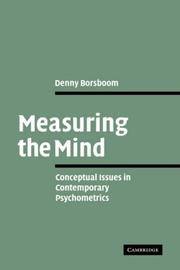
ISBN: 9780521844635 0521844630 9780521102841 9780511490026 051149002X 0511113501 9780511113505 1107151953 1280434856 051118171X 0511198574 0511326769 0511112998 0521102847 Year: 2005 Publisher: Cambridge : Cambridge University Press,
Abstract | Keywords | Export | Availability | Bookmark
 Loading...
Loading...Choose an application
- Reference Manager
- EndNote
- RefWorks (Direct export to RefWorks)
Is it possible to measure psychological attributes like intelligence, personality and attitudes and if so, how does that work? What does the term 'measurement' mean in a psychological context? This fascinating and timely book discusses these questions and investigates the possible answers that can be given response. Denny Borsboom provides an in-depth treatment of the philosophical foundations of widely used measurement models in psychology. The theoretical status of classical test theory, latent variable theory and positioned in terms of the underlying philosophy of science. Special attention is devoted to the central concept of test validity and future directions to improve the theory and practice of psychological measurement are outlined.
#SBIB:303H60 --- Psychometrics. --- Measurement, Mental --- Measurement, Psychological --- Psychological measurement --- Psychological scaling --- Psychological statistics --- Psychology --- Psychometry (Psychophysics) --- Scaling, Psychological --- Psychological tests --- Scaling (Social sciences) --- Bijzondere methoden: algemeen --- Measurement --- Scaling --- Methodology --- Psychometrics --- Methoden en technieken --- meettheorie. --- Health Sciences --- Psychiatry & Psychology

ISBN: 9780335216802 9780335225606 0335225608 9780335216819 0335216811 0335216803 9780335216803 9780335216811 128095387X 9786610953875 Year: 2005 Publisher: Maidenhead New York Open University Press
Abstract | Keywords | Export | Availability | Bookmark
 Loading...
Loading...Choose an application
- Reference Manager
- EndNote
- RefWorks (Direct export to RefWorks)
This widely acclaimed text is an accessible and comprehensible introduction to the use of statistical tests in psychology experiments. Its key objective is to enable students to select appropriate statistical tests to evaluate the significance of data obtained from psychological experiments. An important development for the third edition is that students are introduced to modern statistical packages as a useful tool for calculations, the emphasis being on understanding and interpretation.
Psychometrics. --- Psychology --- Psychological research --- Measurement, Mental --- Measurement, Psychological --- Psychological measurement --- Psychological scaling --- Psychological statistics --- Psychometry (Psychophysics) --- Scaling, Psychological --- Psychological tests --- Scaling (Social sciences) --- Statistical methods. --- Research. --- Measurement --- Scaling --- Methodology
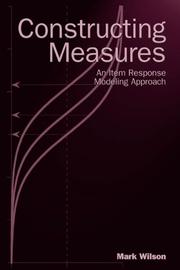
ISBN: 1282322834 1283584867 9786612322839 9786613897312 1135618054 1410611698 9781410611697 0805847855 9781135618001 9781135618049 9781135618056 9780805847857 9781138012813 1135618046 9781000887273 Year: 2005 Publisher: Mahwah, N.J. : Lawrence Erlbaum Associates,
Abstract | Keywords | Export | Availability | Bookmark
 Loading...
Loading...Choose an application
- Reference Manager
- EndNote
- RefWorks (Direct export to RefWorks)
Constructing Measures introduces a way to understand the advantages and disadvantages of measurement instruments, how to use such instruments, and how to apply these methods to develop new instruments or adapt old ones. The book is organized around the steps taken while constructing an instrument. It opens with a summary of the constructive steps involved. Each step is then expanded on in the next four chapters. These chapters develop the ""building blocks"" that make up an instrument--the construct map, the design plan for the items, the outcome space, and the statistical measurement m
Psychometrics. --- Psychology --- Measurement, Mental --- Measurement, Psychological --- Psychological measurement --- Psychological scaling --- Psychological statistics --- Psychometry (Psychophysics) --- Scaling, Psychological --- Psychological tests --- Scaling (Social sciences) --- Research --- Methodology. --- Measurement --- Scaling --- Methodology --- Psychometrics --- Psychology - Research - Methodology

ISBN: 9241563079 9786610436279 1280436271 9240681825 Year: 2005 Publisher: Geneva : World Health Organization : World Psychiatric Association,
Abstract | Keywords | Export | Availability | Bookmark
 Loading...
Loading...Choose an application
- Reference Manager
- EndNote
- RefWorks (Direct export to RefWorks)
Psychiatrists play an important role in the delivery of mental health services. However, global information about the quality of training of psychiatrists is largely unavailable. Do countries train adequate numbers of psychiatrists for their mental health needs? How satisfactory is the training in view of the changing roles of a psychiatrist? Does the training take into account enormously different environments in which psychiatrists work across the world? These and other similar questions needs urgent answers. This Atlas is an initial attempt in this direction.
Behavioral health care --- Centra voor geestelijke gezondheidszorg --- Geestelijke gezondheidszorg --- Geestelijke gezondheidszorg--Diensten --- Mental health care --- Mental health services --- Psychiatric care --- Psychiatric services --- Services de santé mentale --- Psychiatry --- Psychometrics. --- Measurement, Mental --- Measurement, Psychological --- Psychological measurement --- Psychological scaling --- Psychological statistics --- Psychology --- Psychometry (Psychophysics) --- Scaling, Psychological --- Psychological tests --- Scaling (Social sciences) --- Medicine and psychology --- Mental health --- Psychology, Pathological --- Study and teaching --- Measurement --- Scaling --- Methodology
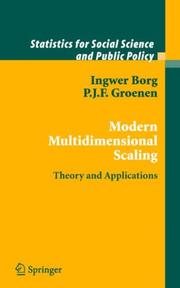
ISBN: 0387251502 1441920463 9786610851881 1280851880 038728981X 9780387251509 Year: 2005 Publisher: New York (N.Y.) Springer
Abstract | Keywords | Export | Availability | Bookmark
 Loading...
Loading...Choose an application
- Reference Manager
- EndNote
- RefWorks (Direct export to RefWorks)
"The book provides a comprehensive treatment of multidimensional scaling (MDS), a family of statistical techniques for analyzing the structure of (dis)similarity data. Such data are widespread, including, for example, intercorrelations of survey items, direct ratings on the similarity on choice objects, or trade indices for a set of countries. MDS represents the data as distances among points in a geometric space of low dimensionality. This map can help to see patterns in the data that are not obvious from the data matrices. MDS is also used as a psychological model for judgments of similarity and preference." "This book may be used as an introduction to MDS for students in psychology, sociology, and marketing. The prerequisite is an elementary background in statistics. The book is also well suited for a variety of advanced courses on MDS topics. All the mathematics required for more advanced topics is developed systematically."--BOOK JACKET
Multidimensional scaling --- Mathematical statistics --- Psychometrics --- 519.535 --- 519.2 --- Measurement, Mental --- Measurement, Psychological --- Psychological measurement --- Psychological scaling --- Psychological statistics --- Psychology --- Psychometry (Psychophysics) --- Scaling, Psychological --- Psychological tests --- Scaling (Social sciences) --- 519.2 Probability. Mathematical statistics --- Probability. Mathematical statistics --- Data processing --- Measurement --- Scaling --- Methodology

ISBN: 0805847855 Year: 2005 Publisher: Mahwah Erlbaum
Abstract | Keywords | Export | Availability | Bookmark
 Loading...
Loading...Choose an application
- Reference Manager
- EndNote
- RefWorks (Direct export to RefWorks)
''Constructing Measures'' introduces a way to understand the advantages and disadvantages of measurement instruments, how to use such instruments, and how to apply these methods to develop new instruments or adapt old ones. The book is organized around the steps taken while constructing an instrument. It opens with a summary of the constructive steps involved. Each step is then expanded on in the next four chapters. These chapters develop the "building blocks" that make up an instrument--the construct map, the design plan for the items, the outcome space, and the statistical measurement model. The next three chapters focus on quality control. They rely heavily on the calibrated construct map and review how to check if scores are operating consistently and how to evaluate the reliability and validity evidence. The book introduces a variety of item formats, including multiple-choice, open-ended, and performance items; projects; portfolios; Likert and Guttman items; behavioral observations; and interview protocols. Each chapter includes an overview of the key concepts, related resources for further investigation and exercises and activities. Some chapters feature appendices that describe parts of the instrument development process in more detail, numerical manipulations used in the text, and/or data results. A variety of examples from the behavioral and social sciences and education including achievement and performance testing; attitude measures; health measures, and general sociological scales, demonstrate the application of the material. An accompanying CD features control files, output, and a data set to allow readers to compute the text's exercises and create new analyses and case archives based on the book's examples so the reader can work through the entire development of an instrument. ''Constructing Measures'' is an ideal text or supplement in courses on item, test, or instrument development, measurement, item response theory, or rasch analysis taught in a
Psychometrics --- Psychology --- Research --- Methodology --- #SBIB:303H10 --- #SBIB:303H14 --- Methoden en technieken: algemene handboeken en reeksen --- Methoden en technieken van de communicatiewetenschap --- Psychometrics. --- Pedagogiek en onderwijskunde --- Methodology. --- didactische theorieën --- didactische theorieën. --- Measurement, Mental --- Measurement, Psychological --- Psychological measurement --- Psychological scaling --- Psychological statistics --- Psychometry (Psychophysics) --- Scaling, Psychological --- Psychological tests --- Scaling (Social sciences) --- Behavioral sciences --- Mental philosophy --- Mind --- Science, Mental --- Human biology --- Philosophy --- Soul --- Mental health --- Research&delete& --- Measurement --- Scaling
Book
ISBN: 1280851880 9786610851881 038728981X Year: 2005 Publisher: New York, NY : Springer New York : Imprint: Springer,
Abstract | Keywords | Export | Availability | Bookmark
 Loading...
Loading...Choose an application
- Reference Manager
- EndNote
- RefWorks (Direct export to RefWorks)
The book provides a comprehensive treatment of multidimensional scaling (MDS), a family of statistical techniques for analyzing the structure of (dis)similarity data. Such data are widespread, including, for example, intercorrelations of survey items, direct ratings on the similarity on choice objects, or trade indices for a set of countries. MDS represents the data as distances among points in a geometric space of low dimensionality. This map can help to see patterns in the data that are not obvious from the data matrices. MDS is also used as a psychological model for judgments of similarity and preference. This book may be used as an introduction to MDS for students in psychology, sociology, and marketing. The prerequisite is an elementary background in statistics. The book is also well suited for a variety of advanced courses on MDS topics. All the mathematics required for more advanced topics is developed systematically. This second edition is not only a complete overhaul of its predecessor, but also adds some 140 pages of new material. Many chapters are revised or have sections reflecting new insights and developments in MDS. There are two new chapters, one on asymmetric models and the other on unfolding. There are also numerous exercises that help the reader to practice what he or she has learned, and to delve deeper into the models and its intricacies. These exercises make it easier to use this edition in a course. All data sets used in the book can be downloaded from the web. The appendix on computer programs has also been updated and enlarged to reflect the state of the art. Ingwer Borg is Scientific Director at the Center for Survey Methodology (ZUMA) in Mannheim, Germany, and Professor of Psychology at the University of Giessen, Germany. He has authored or edited 14 books and numerous articles on data analysis, survey research, theory construction, and various substantive topics of psychology. He also served as president of several professional organizations. Patrick Groenen is Professor in Statistics at the Econometric Institute of the Erasmus University Rotterdam, the Netherlands. Before, he was assistant professor at the Department of Data Theory at Leiden University in the Netherlands. He is an associate editor for three international journals. He has published on MDS, unfolding, optimization, multivariate analysis, and data analysis in various top journals.
Multidimensional scaling. --- Multidimensional scaling --- Psychometrics. --- Data processing. --- Measurement, Mental --- Measurement, Psychological --- Psychological measurement --- Psychological scaling --- Psychological statistics --- Psychology --- Psychometry (Psychophysics) --- Scaling, Psychological --- Psychological tests --- Scaling (Social sciences) --- Psychometrics --- Measurement --- Scaling --- Methodology --- Statistics. --- Marketing. --- Optical pattern recognition. --- Mathematical statistics. --- Statistics for Social Sciences, Humanities, Law. --- Pattern Recognition. --- Statistics and Computing/Statistics Programs. --- Mathematics --- Statistical inference --- Statistics, Mathematical --- Statistics --- Probabilities --- Sampling (Statistics) --- Optical data processing --- Pattern perception --- Perceptrons --- Visual discrimination --- Consumer goods --- Domestic marketing --- Retail marketing --- Retail trade --- Industrial management --- Aftermarkets --- Selling --- Statistical analysis --- Statistical data --- Statistical methods --- Statistical science --- Econometrics --- Marketing --- Statistics . --- Pattern recognition. --- Design perception --- Pattern recognition --- Form perception --- Perception --- Figure-ground perception
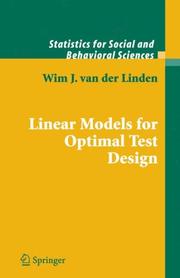
ISBN: 1280427051 9786610427055 0387290540 0387202722 1441919031 Year: 2005 Publisher: New York, NY : Springer New York : Imprint: Springer,
Abstract | Keywords | Export | Availability | Bookmark
 Loading...
Loading...Choose an application
- Reference Manager
- EndNote
- RefWorks (Direct export to RefWorks)
This book begins with a reflection on the history of test design--the core activity of all educational and psychological testing. It then presents a standard language for modeling test design problems as instances of multi-objective constrained optimization. The main portion of the book discusses test design models for a large variety of problems from the daily practice of testing, and illustrates their use with the help of numerous empirical examples. The presentation includes models for the assembly of tests to an absolute or relative target for their information functions, classical test assembly, test equating problems, item matching, test splitting, simultaneous assembly of multiple tests, tests with item sets, multidimensional tests, and adaptive test assembly. Two separate chapters are devoted to the questions of how to design item banks for optimal support of programs with fixed and adaptive tests. Linear Models for Optimal Test Design, which does not require any specific mathematical background, has been written to be a helpful resource on the desk of any test specialist. Wim J. van der Linden is Professor of Measurement and Data Analysis, University of Twente, The Netherlands. His specialization is psychometric theory and methods, and he has been an active researcher of item response theory throughout his career. His current research is on test design, adaptive testing, test equating, and response-time modeling. Professor van der Linden is a past president of the Psychometric Society and a recipient of the NCME lifetime achievement award for his work on educational measurement.
Psychometrics. --- Linear models (Statistics) --- Measurement, Mental --- Measurement, Psychological --- Psychological measurement --- Psychological scaling --- Psychological statistics --- Psychology --- Psychometry (Psychophysics) --- Scaling, Psychological --- Psychological tests --- Scaling (Social sciences) --- Measurement --- Scaling --- Methodology --- Models, Linear (Statistics) --- Mathematical models --- Mathematical statistics --- Statistics --- Statistics. --- Educational tests and measuremen. --- Statistics for Social Sciences, Humanities, Law. --- Assessment, Testing and Evaluation. --- Statistical analysis --- Statistical data --- Statistical methods --- Statistical science --- Mathematics --- Econometrics --- Educational tests and measurements. --- Educational assessment --- Educational measurements --- Mental tests --- Tests and measurements in education --- Psychological tests for children --- Psychometrics --- Students --- Examinations --- Rating of --- Statistics . --- Assessment.
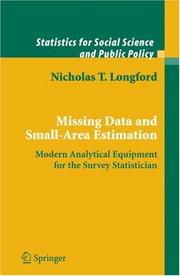
ISBN: 1280312181 9786610312184 1846281954 1852337605 9781852337605 Year: 2005 Publisher: London : Springer London : Imprint: Springer,
Abstract | Keywords | Export | Availability | Bookmark
 Loading...
Loading...Choose an application
- Reference Manager
- EndNote
- RefWorks (Direct export to RefWorks)
This book develops methods for two key problems in the analysis of large-scale surveys: dealing with incomplete data and making inferences about sparsely represented subdomains. The presentation is committed to two particular methods, multiple imputation for missing data and multivariate composition for small-area estimation. The methods are presented as developments of established approaches by attending to their deficiencies. Thus the change to more efficient methods can be gradual, sensitive to the management priorities in large research organisations and multidisciplinary teams and to other reasons for inertia. The typical setting of each problem is addressed first, and then the constituency of the applications is widened to reinforce the view that the general method is essential for modern survey analysis. The general tone of the book is not "from theory to practice," but "from current practice to better practice." The third part of the book, a single chapter, presents a method for efficient estimation under model uncertainty. It is inspired by the solution for small-area estimation and is an example of "from good practice to better theory." A strength of the presentation is chapters of case studies, one for each problem. Whenever possible, turning to examples and illustrations is preferred to the theoretical argument. The book is suitable for graduate students and researchers who are acquainted with the fundamentals of sampling theory and have a good grounding in statistical computing, or in conjunction with an intensive period of learning and establishing one's own a modern computing and graphical environment that would serve the reader for most of the analytical work in the future. While some analysts might regard data imperfections and deficiencies, such as nonresponse and limited sample size, as someone else's failure that bars effective and valid analysis, this book presents them as respectable analytical and inferential challenges, opportunities to harness the computing power into service of high-quality socially relevant statistics. Overriding in this approach is the general principle—to do the best, for the consumer of statistical information, that can be done with what is available. The reputation that government statistics is a rigid procedure-based and operation-centred activity, distant from the mainstream of statistical theory and practice, is refuted most resolutely. After leaving De Montfort University in 2004 where he was a Senior Research Fellow in Statistics, Nick Longford founded the statistical research and consulting company SNTL in Leicester, England. He was awarded the first Campion Fellowship (2000–02) for methodological research in United Kingdom government statistics. He has served as Associate Editor of the Journal of the Royal Statistical Society, Series A, and the Journal of Educational and Behavioral Statistics and as an Editor of the Journal of Multivariate Analysis. He is a member of the Editorial Board of the British Journal of Mathematical and Statistical Psychology. He is the author of two other monographs, Random Coefficient Models (Oxford University Press, 1993) and Models for Uncertainty in Educational Testing (Springer-Verlag, 1995).
Surveys --- Social surveys --- Missing observations (Statistics) --- Estimation theory. --- Social sciences --- Methodology. --- Research --- Statistical methods. --- Estimating techniques --- Least squares --- Mathematical statistics --- Stochastic processes --- Data, Missing (Statistics) --- Missing data (Statistics) --- Missing values (Statistics) --- Observations, Missing (Statistics) --- Values, Missing (Statistics) --- Estimation theory --- Multivariate analysis --- Multiple imputation (Statistics) --- Government surveys --- Mathematical geography --- Mathematical statistics. --- Statistics. --- Computer simulation. --- Epidemiology. --- Psychometrics. --- Statistical Theory and Methods. --- Statistics for Social Sciences, Humanities, Law. --- Simulation and Modeling. --- Statistics and Computing/Statistics Programs. --- Diseases --- Public health --- Measurement, Mental --- Measurement, Psychological --- Psychological measurement --- Psychological scaling --- Psychological statistics --- Psychology --- Psychometry (Psychophysics) --- Scaling, Psychological --- Psychological tests --- Scaling (Social sciences) --- Computer modeling --- Computer models --- Modeling, Computer --- Models, Computer --- Simulation, Computer --- Electromechanical analogies --- Mathematical models --- Simulation methods --- Model-integrated computing --- Statistical analysis --- Statistical data --- Statistical methods --- Statistical science --- Mathematics --- Econometrics --- Statistical inference --- Statistics, Mathematical --- Statistics --- Probabilities --- Sampling (Statistics) --- Measurement --- Scaling --- Methodology --- 519.2 --- 519.2 Probability. Mathematical statistics --- Probability. Mathematical statistics --- Behavioral sciences --- Human sciences --- Sciences, Social --- Social science --- Social studies --- Civilization --- Research&delete& --- Statistics .
| Listing 1 - 10 of 10 |
Sort by
|

 Search
Search Feedback
Feedback About
About Help
Help News
News